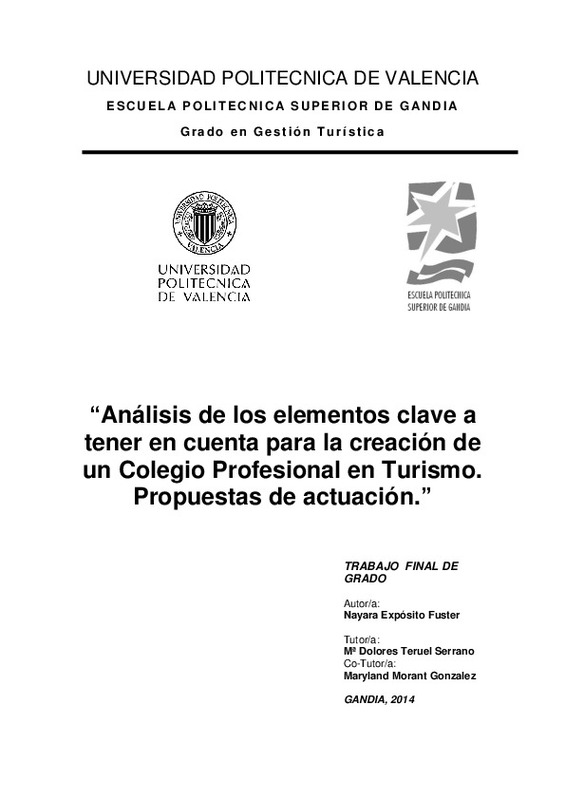|
El presente trabajo fin de grado, consiste en el análisis de los elementos clave a tener en cuenta para la creación de un Colegio Profesional. El análisis se hace dentro del sector turístico, basándose en los perfiles ...[+]
El presente trabajo fin de grado, consiste en el análisis de los elementos clave a tener en cuenta para la creación de un Colegio Profesional. El análisis se hace dentro del sector turístico, basándose en los perfiles profesionales y las competencias que deben tener los profesionales en turismo aplicando la legislación tanto nacional como internacional.
El punto clave con mayor dificultad de la investigación, ha sido el del análisis de los aspectos clave que debe tener una profesión para poder obtener el derecho a colegiación. El problema surge cuando aparecen el concepto de profesión reglada y las directivas que la regulan.
El trabajo se ha realizado en base a la metodología cuantitativa y cualitativa, obteniendo información mediante encuestas, entrevistas y análisis bibliográfico. Los resultados de las mismas arrojan datos favorables para apoyar la creación del Colegio Profesional así comodatos en los que se ponen de manifiesto necesidades de cambio como la regulación de la profesión turística.
Las conclusiones obtenidas se han centrado en los datos obtenidos en el trabajo siguiendo los objetivos planteados. Algunas conclusiones van en la línea de que han existido dos Colegios Profesionales en Turismo en España y en que el hecho de que no hayan evolucionado en las Comunidades Autónomas se debe a problemas legislativos.
[-]
This bachelor thesis work is an analysis of the key elements to consider for the creation of a professional association. This analysis is done within the touristic sector, based on the professional profiles and skills ...[+]
This bachelor thesis work is an analysis of the key elements to consider for the creation of a professional association. This analysis is done within the touristic sector, based on the professional profiles and skills required by tourist professionals throughout the application of national and international legislation. The most difficult key point of research has been the analysis of key things to keep a job in order to get the right of licensing. The problem arises when the concepts of “regulated profession” and “directives that regulate” appear. The work has been done using both quantitative and qualitative methodology, obtaining information from surveys, interviews, and literature reviews. The results of this yield has favoured the support of the creation of the Professional Association and bailment when an apparent change has been needed, like the regulation of tourist trade data.
The conclusions obtained focus on data obtained following fixed objectives. Some conclusions draw that there have been two schools of tourism in Spain: Tourism Professionals, and another conclusion is that they have not evolved in Autonomous Communities due to legislative problems.
[-]
|







